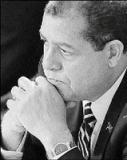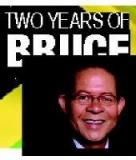Columns By Category
Popular Articles
- THE REALITY OF TACKY AND SAM SHARPE
- PLEASE DON’T BETRAY US AGAIN POLITICIANS
- CRY, MY MURDEROUS COUNTRY
- MODERNIZING THE PNP: VERSION.2020
- IS THE EXCHANGE RATE ON TARGET OR IS IT A WHOPPER?
- CARICOM: BEACON OF DEMOCRACY OR COWARDLY DISGRACE?
- DEMOCRACY PREVAILS IN THE UNITED STATES
- THE CRIME STATISTICS SPEAK FOR THEMSELVES
- PETROJAM, OIL PRICES, AND THE $7 TAX
- Kevin O'Brien Chang | Brains, not brutality – smart(phone) crime fighting
- TERRORISM IN JAMAICA
- STOP CURRENCY CRISIS TALK
- 'CASTIGATED KD' AND THE 9 YEAR WONDER
- GET PAST MERE TALK ON DONS AND GARRISONS
- LOW VOTER TURNOUT MYTHS AND ELECTION PREDICTIONS
- HOW GREAT CAN BROGAD BE?
- PNP WAS SOCIALIST FROM THE START
- AN AGE AND GENDER RE-ALIGNMENT ELECTION?
- Most influential Jamaican of 2010-2019?
- NO GAYLE, NO RUSSELL, NO TALLAWAHS
2009 Articles
A Weak Hand Poorly Played
- Article
- December 20, 2009
- No comments
In domino terms, Prime Minister Bruce Golding has drawn an economic hand with six doubles, meaning he has very few options on how to play his cards. After all, Jamaica entered the global financial crisis with a net government deficit of 113 per cent, the fourth highest in the world, leading Forbes magazine to list it as one of the world's ten hardest hit economies - and this was before bauxite collapsed and remittances plunged.
God's Second Greatest Gift to Mankind
- Article
- December 6, 2009
- No comments
The following is an excerpt of a speech given at the National Library's 30th Anniversary Awards Dinner
Sometimes in idle moments I contemplate life's blessings, and make a list of the things that bring me the most joy. Number three on my happiness list is cricket, lovely, cricket. No other game, and indeed few other pastimes, produces such moments of beauty. Watching a great innings unfold is, to me, like seeing a gorgeous painting being created before your very eyes. My idea of paradise includes Brian Lara batting at one end and Gary Sobers at the other, both playing glorious strokes all around the wicket. Although the way the West Indies are playing these days, I might soon have to find a new number three!
Fighting a Losing Battle?
- Article
- November 15, 2009
- No comments
When Bruce Golding was National Democratic Movement (NDM) leader, he pledged to eliminate garrisons. Put him in power, and he would end the pernicious system that loads constituencies with party die-hards who violently intimidate opponents. Golding is now prime minister and, since the People's National Party (PNP) outnumbers the Jamaica Labour Party (JLP) in "hardcore" garrisons by about six to three, he has every incentive to follow through on his words. But his 'No more tribal politics!' promise seems to have been completely forgotten.
But then most Jamaicans, even educated ones who should know better, seem to have a problem with garrisons only when it involves the other side. Patient no care, doctor no care.
Better Late than Never
- Article
- November 8, 2009
- No comments
Danville Walker, Greg Christie, Paula Llewellyn and Les Green are making Jamaicans more hopeful about our body politic than we've been in a long time. All have demonstrated an unbiased willingness to say it like it is, and to act as they see fit, regardless of whose feathers they ruffle. So there's a wary optimism in many hearts that maybe, just maybe, the system is starting to work for the tax-paying public, and not to protect privileged insiders.
Should we add Bruce Golding to this list? His no-holds-barred exposure of the disgraceful contract under which former Bank of Jamaica governor, Derick Latibeaudiere was employed has won much favour with the public. Too often we've been left on the outside looking in, as our tax dollars are lavishly doled out without our knowledge, much less consent.
'A Woman we Name!'
- Article
- October 25, 2009
- No comments
"A woman we name, so we born lucky!" - Lady Saw.
Over the last three years, 141 Jamaicans have taken their lives, 128 men and 13 women. Jamaica's suicide level is pretty low by world standards. There were 48 in 2008, meaning a national rate of about 1.66 per 100,000, far below say Lithuania's world leading 38.6, Trinidad's 12.8 or the United States' 11.1. Yet while men everywhere kill themselves more often than women, our 10-1 sexual disparity is virtually unprecedented.
Not Completely Black and White
- Article
- October 4, 2009
- No comments
"In the western industrialised world, the idea of electing a member of a racial minority to the highest office seems an astonishing breakthrough. But Jamaica's 95 per cent black population elected a white man - Edward Seaga - as its prime minister in 1980."
- Nicholas D. Kristof, New York Times, October 23, 2008
Only tourist board pollyannas could pretend skin colour does not matter in Jamaica. One glance through the social pages shows the still existing inequities - itself a topic for another day. Yet, imperfect as they are, race relations here are still better than in most places.
A Fighting Knock on a Sticky Wicket
- Article
- August 30, 2009
- No comments
IF JAMAICAN politics was a cricket match, the state of play report might read something like this.
"Put into bat on a sticky wicket, the Jamaica Labour Party (JLP) Government reached 220 for six, thanks mainly to an unbeaten captain's knock of 85 from Bruce Golding. With the ball swinging and spinning on a pitch of uneven bounce, the JLP lost the early wickets of Derrick Smith, Trevor MacMillan and Clive Mullings.
"But with decent support from Ed Bartlett, and a good half century by Andrew Holness, skipper Golding shepherded his side to a reasonable total, which may be larger than it seems on a tricky track. The JLP was aided immensely by the PNP's amateur field setting and proliferation of wides and no balls. Yet, with the fragile Labourite batting line up so over-dependent on its leader, the match remains very much in the balance."
The World's Greatest all Round Track Coach
- Article
- August 23, 2009
- No comments
ONCE UPON a time a Jamaican gold medal at the Olympics or the World Championships in Athletic was a rare event, and a medal of any kind was reason for celebration. Between 1964 and 2004, we won only four Olympic golds, and an average of three medals per Games. Between the first World Championships in 1983 and 2003, we won three individual and three relay golds, and an average of under six medals per meet.
Lady Bustamante and the Distortion of History
- Article
- August 2, 2009
- No comments
History may be written by victors, but it's also written by writers. Which means that its intelligentsia may well have an even greater impact on a nation's accepted past than its generals or politicians. As the old joke goes, historians are able to do what is impossible even for God - namely, change the past.
History is largely a product of university denizens, who tend towards the left side of the political spectrum. Perhaps this is because leftist political dogmas like socialism and Marxism are themselves largely the products of academics and very amenable to theoretical dissection. This possibly explains why Stalin, for instance, still gets relatively good press compared to Hitler, even though they had equally blood-stained records. Or why so many who praise Castro revile Pinochet, despite both being iron-fisted military dictators who brooked no dissent.
An Imagined West Indian Nation
- Article
- July 19, 2009
- No comments
National anthems were played before each match at the recent Cricket Twenty20 World Cup. Englishmen sang along to 'God Save the Queen' and Australians to 'Advance Australia Fair'. For the West Indies, it was 'Rally Round the West Indies'.
So there was the intriguing spectacle of players standing at attention to the 'national anthem' of an imagined country that exists only in the minds of cricket fans - 'Rally, rally round the West Indies/now and forever'.





